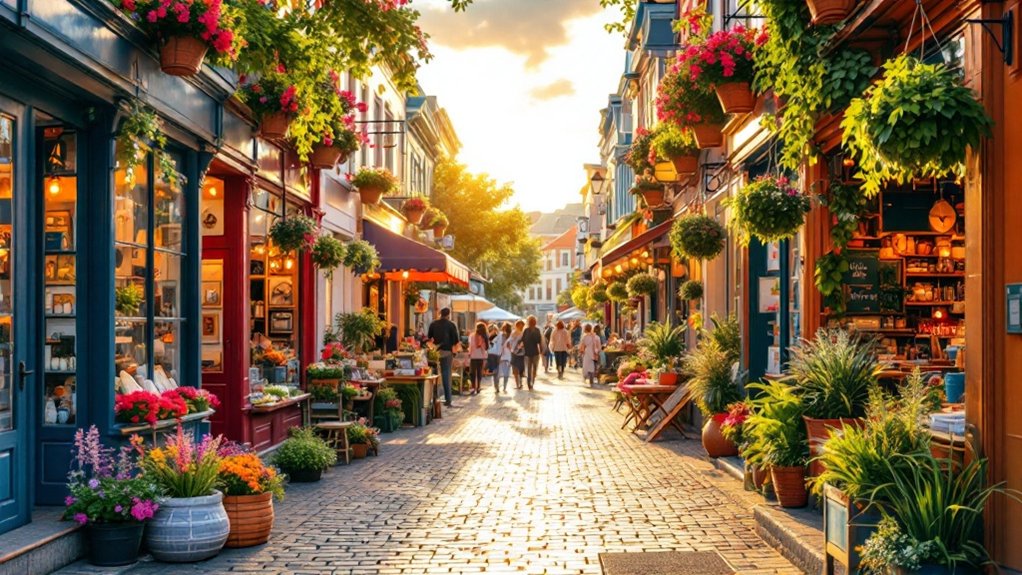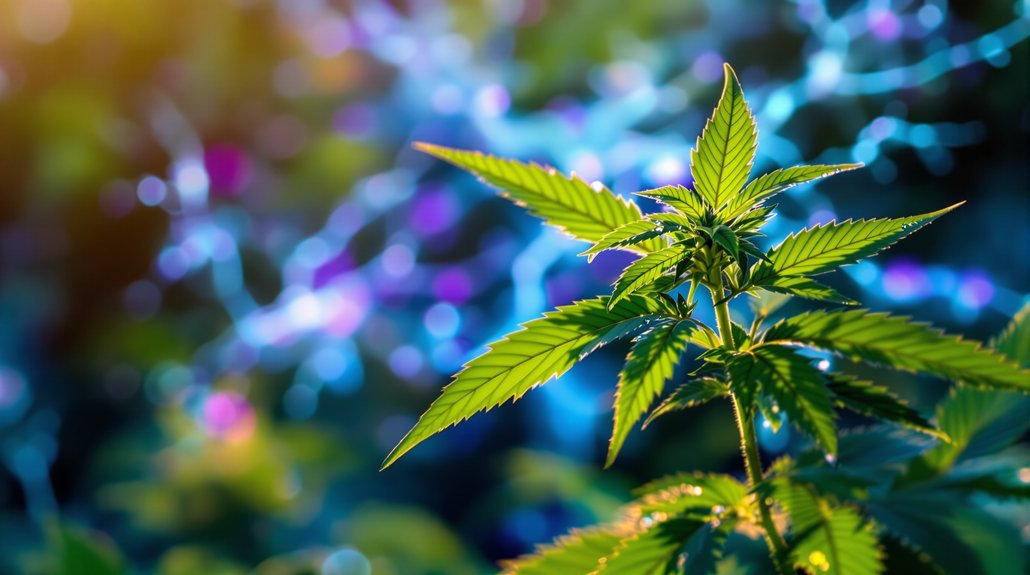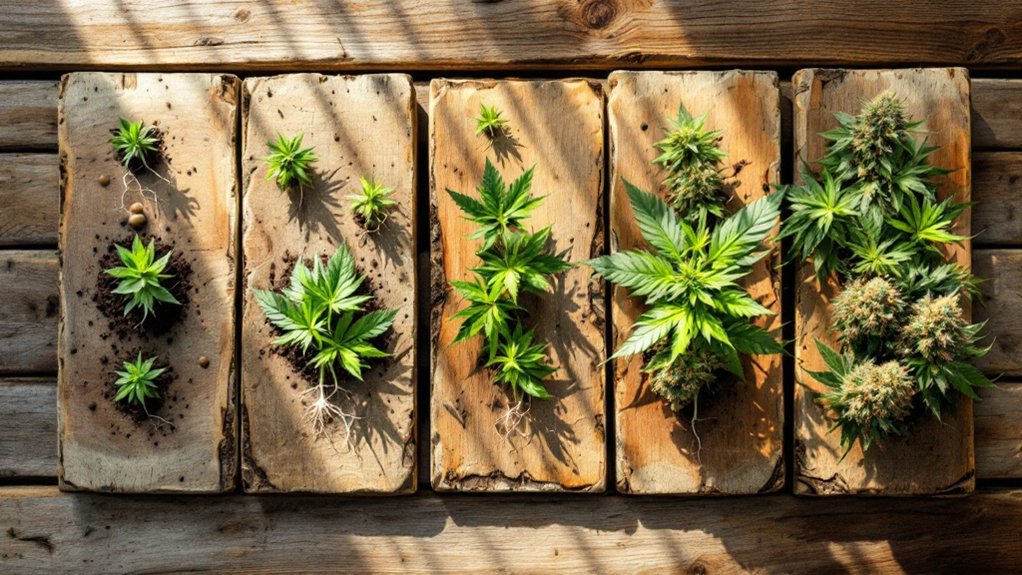Cannabis legalization has transformed local economies far beyond dispensary walls, creating unexpected opportunities for artists, restaurateurs, and traditional businesses. Denver’s creative district now hosts cannabis-themed art installations that draw thousands of tourists monthly. Michelin-starred chefs in California craft elevated infused dining experiences for adventurous foodies. Even rideshare drivers and boutique hotels report revenue spikes in cannabis-friendly zones. The green rush isn’t just about pot, it’s reshaping entire communities in ways nobody anticipated.
Creative Communities Flourish: Artists and Performers Capitalize on Cannabis Tourism Demand

While cannabis legalization transforms local economies, creative communities are experiencing an unexpected renaissance as artists and performers discover lucrative opportunities within the burgeoning cannabis tourism market.
Cannabis-themed festivals are becoming cultural powerhouses, featuring live music, art exhibitions, and performance art that draw diverse audiences far beyond traditional cannabis consumers. These events create substantial revenue streams for artists through ticket sales, merchandise, and onsite commissions. Events that offer edible tastings with precise THC dosing have become particularly popular among tourists seeking unique sensory experiences.
Cities like Los Angeles, Denver, and Amsterdam showcase dramatic increases in cannabis-themed street art and murals, with brands commissioning public art projects that provide financial support to local creators. Artists often incorporate cannabis leaves and icons as powerful symbols of liberation and connection to nature in their large-scale public works.
Cannabis brands are transforming urban landscapes by funding street art projects that financially empower local artists while celebrating legalization culture.
The collaboration extends beyond visual arts. Musicians develop cannabis-friendly performances, while writers explore cannabis culture in literature and stage productions. These creative endeavors foster community engagement by bringing together diverse audiences who share an appreciation for both artistic expression and cannabis culture.
Multi-medium partnerships between cannabis companies and artists are accelerating, creating exhibition opportunities and workshops that attract tourists seeking authentic creative experiences.
Culinary Innovation Takes Center Stage: Chefs and Food Entrepreneurs Ride the Green Wave
The cannabis culinary revolution is transforming local food scenes as enterprising chefs and food entrepreneurs discover that infused dining experiences represent one of the most profitable sectors within cannabis tourism.
Farm-to-table cannabis dinners and specialized cooking classes are becoming signature attractions in destinations like California, Colorado, and Oregon. Creative chefs are developing strain-specific food pairings and innovative delivery systems, including nanoemulsions in beverages for precise dosing.
Food trucks capitalize on cannabis events while established restaurants experiment with CBD and THC menu adaptations. These culinary entrepreneurs benefit from the industry’s impressive 13.2% growth rate as the cannabis tourism market continues its rapid expansion. The delayed onset of edible effects requires chefs to educate guests about responsible consumption timelines during these dining experiences.
The market’s projected growth to $25.7 billion by 2030 reflects surging demand. International culinary hotspots like Amsterdam and Toronto now market cannabis food tourism as core visitor draws.
This culinary innovation creates new revenue streams while establishing destinations as gourmet cannabis capitals. The cannabis-infused beverage segment shows particularly strong momentum with microdosing becoming an increasingly popular approach among discerning consumers.
Beyond the Dispensary: Traditional Businesses Discover New Revenue Streams

As cannabis tourism gains momentum across legalization states, traditional businesses far removed from cultivation or retail are discovering that proximity to the green economy translates into surprising revenue windfalls.
Hotels in legalization markets saw revenues jump 25.2%, adding $63,671 monthly per property after nearby dispensary openings. Room bookings climbed 7.9% while daily rates increased 16%.
Transportation services capitalized quickly. Rideshare operators introduced cannabis-themed tours, while limousine companies marketed luxury dispensary runs.
Even gift shops expanded inventory with cannabis-branded souvenirs. Wellness centers integrated cannabis-friendly offerings, and food trucks positioned near dispensaries captured late-night business.
Comedy clubs and music venues strategically timed shows around cannabis events. Hotels responded to sustained demand by expanding their room inventory by an average of 3.9% to accommodate the growing influx of cannabis tourists. Destination organizations are now serving as community brand managers, strategically integrating these unique cannabis experiences into broader tourism strategies that align with local values and priorities. The emerging industry contributed an impressive economic impact of approximately $115.2 billion to the broader economy. The ripple effect proves that green tourism lifts all boats, not just those selling the green itself.
From Amsterdam to California: Success Stories of Economic Transformation
Decades before American states began experimenting with legalization, Amsterdam transformed itself into the world’s cannabis tourism capital and the economic lessons from that transformation now echo across California dispensaries, Colorado mountain towns, and emerging markets worldwide.
Amsterdam’s coffeeshops generate €283 million ($330m USD) annually, with 58% of international visitors arriving primarily for cannabis experiences. This economic magnetism extends far beyond dispensaries into hotels, restaurants, and cultural attractions.
California and Colorado have replicated this success on American soil. Cannabis tourism now drives hundreds of millions in local revenue through increased hotel bookings and restaurant visits. Legal markets create unique travel destinations for enthusiasts seeking curated experiences beyond simple consumption.
Forty percent of U.S. leisure travel carries cannabis motivation, while 70% of Gen Z travelers prioritize legal access when selecting destinations. The global market reached $57.18 billion in 2023, supporting entrepreneurs from Jamaica to Germany. Countries with established medicinal cannabis laws are leveraging their legal frameworks to attract wellness-focused tourists seeking therapeutic experiences.










